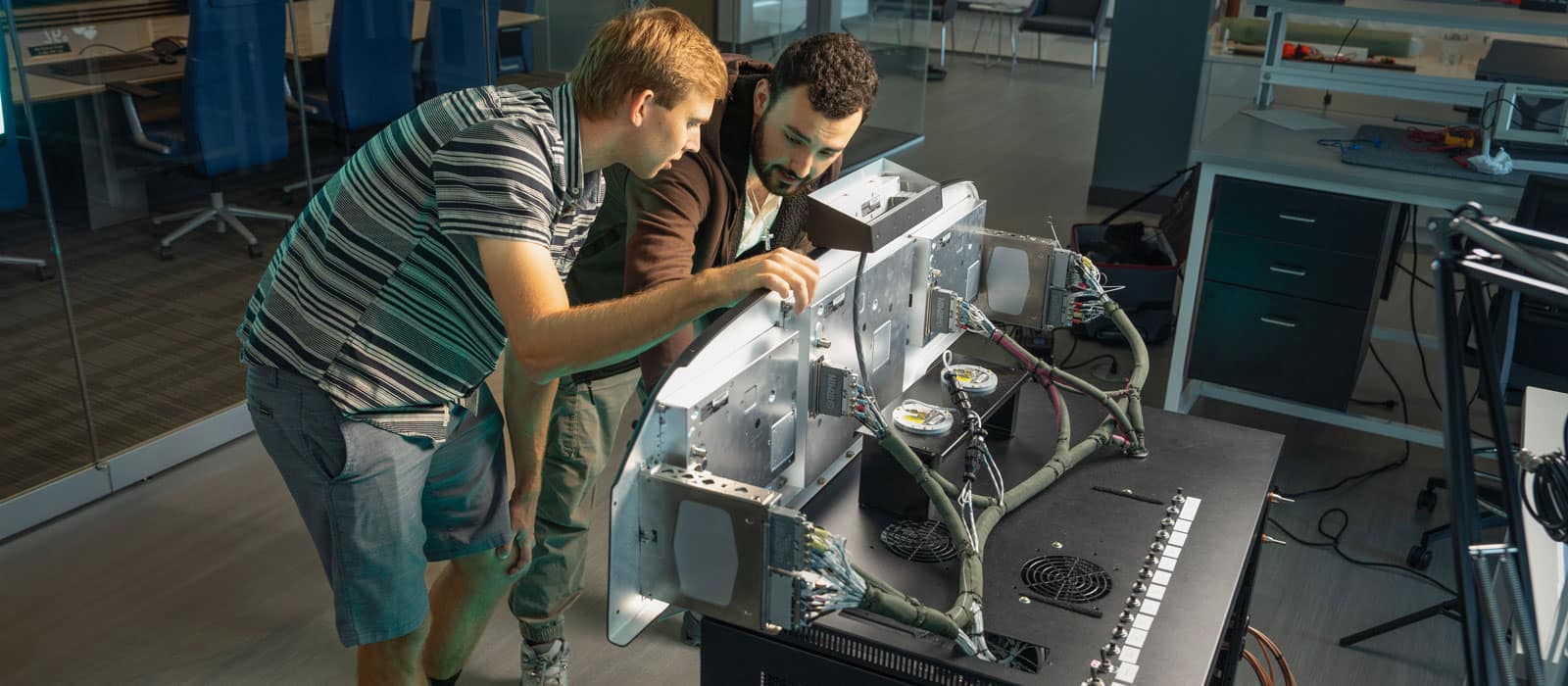
Bachelor of Science in
Systems Engineering
The Bachelor of Science in Systems Engineering focuses on broad applications across a range of disciplines addressing system-level modeling, analysis and operation.
About the Bachelor of Science in Systems Engineering
Systems Engineering has been an accepted practice for decades in the aviation, aeronautics, aerospace and defense industries. The Bachelor of Science in Systems Engineering teaches you how to oversee and improve large projects by understanding how all parts work together.
Embry-Riddle graduates will gain the technical knowledge to collaborate across various engineering disciplines. They will also learn strategic decision-making skills to improve the performance of intricate systems. This includes a deep understanding of systems thinking, an approach that's all about viewing a project as a whole rather than just in parts.
Why You Should Study this Degree
Systems Engineering is more than just technology; it’s about working with others to solve real-world challenges through a big-picture approach. Systems Engineering may be for you if you like:
-
Being the mastermind behind a big project
-
Figuring out how each part of a puzzle connects
-
Finding solutions to big issues like transportation systems and sustainable buildings
-
Making sure teams work well together
Student Learning Outcomes
What you will learn while pursuing a Systems Engineering degree:
- Development of processes related to the engineering life cycle and management of systems.
- Application of systems engineering methods, techniques and tools as they relate to the stages of the system design process.
- Utilization of engineering management methods, techniques and tools as they relate to system development.
Systems Engineering Career Opportunities
Careers and Employers
Embry Riddle’s Systems Engineering students often secure positions as systems engineers, systems analysts and reliability and safety engineers.
Students majoring in Systems Engineering enter the industry with companies such as:
- The Boeing Company
- Collins Aerospace
- Northrop Grumman
Systems Engineering Salary Information
As of 2023, graduates with a degree in Systems Engineering receive competitive salaries, with an average income of $73,621 annually.
DETAILS
About Systems Engineering at the Daytona Beach, FL Campus
This degree will be available May 1, 2024.
Systems Engineering students participate in hands-on projects from day one by working with small hardware and software systems that interact in the industry. Embry-Riddle prepares graduates for success with sharp technical skills and introduces them to engineering processes used in aerospace and aviation.
Students in the systems engineering program have access to the Electrical Engineering and Computer Science (EECS) Student Projects lab, which supports student projects across multiple fields, and the Cybersecurity Engineering Laboratory to practice advanced cybersecurity techniques.
Systems Engineering Information
- Credits: 125
- Online or In-Person: In-Person
Helpful Links
- Tour our Daytona Beach Campus
- Discover the Department's Faculty
- Explore the Fields of Study: Engineering & Computer & Technology
- Find Related Clubs & Organizations
General Education Requirements
For a full description of Embry-Riddle General Education guidelines, please see the General Education (https://catalog.erau.edu/ daytona-beach/general-education/) section of this catalog. These minimum requirements are applicable to all degree programs.
| Communication Theory & Skills (COM 122, COM 219, COM 221) | 9 |
| Lower-Level Humanities | 3 |
| Lower-Level Social Sciences (PSY 101) | 3 |
| Lower or Upper-Level Humanities or Social Sciences | 3 |
| Upper-Level Humanities or Social Sciences | 3 |
| Computer Science* | 3 |
| Mathematics (MA 241 & MA 242) | 8 |
| Physical and Life Sciences (PS 150, PS 160, PS 226L) | 7 |
| Total Credits | 39 |
* Computer Science required course: Aerospace Systems Engineering AOC must take EGR 115; Enterprise Systems Engineering AOC must take CS 223.
Systems Engineering Core Requirements
| UNIV 101 | College Success | 1 |
| MA 243 | Calculus and Analytical Geometry III | 4 |
| MA 345 | Differential Equations and Matrix Methods | 4 |
| MA 412 | Probability and Statistics | 3 |
| EGR 101 | Introduction to Engineering 3 | 2 |
| ES 201 | Statics | 3 |
| ES 204 | Dynamics | 3 |
| HF 300 | Human Factors I: Principles and Fundamentals | 3 |
| HF 312 | Ergonomics and Bioengineering | 3 |
| Technical Elective (Science)1 | 4 | |
| Technical Elective2 | 3 | |
| Systems Engineering Courses | ||
| SYS 301 | Introduction to Systems Engineering | 3 |
| SYS 302 | System Engineering Design Considerations | 3 |
| SYS 303 | Optimization in Systems Engineering | 3 |
| SYS 304 | Trade Studies, Risk and Decision Analysis | 3 |
| SYS 401 | Systems Modeling and Simulation | 3 |
| SYS 402 | Optimization in Systems Engineering II | 3 |
| SYS 403 | Systems Engineering Life Cycle Costing | 3 |
| SYS 415 | Systems Engineering Practices: Specialty Engineering | 3 |
| SYS 417 | Systems Engineering Capstone Project I | 3 |
| SYS 418 | Systems Engineering Capstone Project II | 3 |
| Total Credits | 63 |
- Technical Elective (Science): Science course with a lab (4 credits). Examples: BIO 120 and BIO 120L / CHM 110 and CHM 110L / PS228andPS228L/PS 250 and PS 253
- Technical Elective: CEC/CS/EE/SE/SYS/ME/AE/CE Upper-Level Elective (3 credits)
- Aerospace Systems Engineering AOC students are required to enroll in the Aerospace Engineering Topic of EGR 101; Enterprise Systems Engineering AOC student are required to enroll in the EECS Engineering Topic of EGR 101.
Aerospace Systems Engineering Area of Concentration
| AE 201 | Aerospace Flight Vehicles | 3 |
| AE Courses (Pick one of the following) | 3 | |
| AE 313 | Space Mechanics | |
| AE 319 | Aerodynamics | |
| AE 323 | Spacecraft Systems | |
| EGR 120 | Graphical Communications | 3 |
| EE 311 | Robotics Technologies for Unmanned Systems | 3 |
| EE 327 | Electrical Engineering Fundamentals | 3 |
| EE 328 | Electrical Engineering Fundamentals Laboratory | 1 |
| EE 401 | Control Systems Analysis and Design | 3 |
| EE 402 | Control Systems Laboratory | 1 |
| ES 305 | Thermodynamics | 3 |
| Total Credits | 3 |
Enterprise Systems Engineering Area of Concentration
| CEC 220 | Digital Circuit Design | 3 |
| CEC 222 | Digital Circuit Design Laboratory | 1 |
| CEC 320 | Microprocessor Systems/td> | 3 |
| CEC 322 | Microprocessor Systems Laboratory | 1 |
| Systems Engineering Technical Electives (Pick four of the following six SYS courses) |
12 | |
| SYS 310 | Systems Architecture, Modeling and Simulation | |
| SYS 320 | Systems Engineering Practices | |
| SYS 405 | Aerospace Systems Guidance and Control | |
| SYS 410 | Space Systems and Mission Analysis | |
| SYS 425 | System Quality Engineering | |
| SYS 460 | Systems Engineering Management | |
| Technical Elective 2 | 3 | |
| Total Credits | 23 | |
| Total Degree Credits | 125 |
2. Technical Elective: CEC/CS/EE/SE/SYS/ME/AE/CE Upper-Level Elective (3 credits)
Get Started Now:
Summary
125 Credits
Estimate your tuition by using the Tuition Calculator
View Financial Aid Information
Learn about our General Education
Find out about transferring credits to this degree
Learn more about our Veterans & Military benefits
View our Academic Calendar




